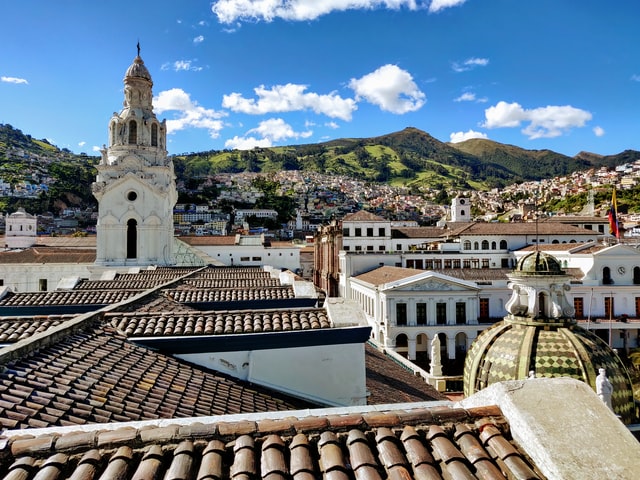Ecuador Travel Tips: Protecting Life, Limb, and Credit Card

It was a moonless night, and we knew better than to walk down unlit streets in Quito. But after a few months of living in Ecuador, my boyfriend Michael and I felt more inclined to save a couple of dollars and walk rather than take a cab.
We were almost at Michael’s apartment when we saw them – two lanky Ecuadorians running towards us. I immediately gripped Michael’s arm. He tried to reassure me by saying that the men were just in a rush, but I knew that Ecuadorians rarely hurried for anything. Sure enough, the two men stopped us and began speaking rapid Spanish. I froze. We were about to be mugged. I had imagined it, but had never experienced it. One of the men started reaching into my sweatshirt pocket, searching for something to take. Feeling as lifeless as a limp marionette, I let him search, unable to twitch a muscle, hardly able to breathe.
I heard Michael argue with the other thief, and then suddenly, without warning, both thieves ran off. Whether they were afraid that someone was about to come out of the house, or perhaps just confused by Michael’s reaction, I’ll never know.
Eat an unwashed strawberry in the market, and you might find yourself feverish and vomiting for the next day.
We were, of course, extraordinarily lucky. Several of my friends have been held up at knifepoint, and when that happens, there’s obviously no choice but to hand the mugger whatever you’ve got. And arguing (knife or not) isn’t a great idea either. Because let’s face it – it’s better to have a happy mugger on your hands than an angry one.
While petty thievery is a problem here, serious crime is much less of one. Because of rampant poverty, most people are just looking for a few more bucks, and not to cause serious harm. Your greatest risk is probably having your wallet lifted out of your pocket while you’re squished onto a crowded trolley, or to have your purse snatched from under your chair at a restaurant. Even if someone does mug you, these thieves generally just take your things and go.
Many of the risks in Ecuador are far more mundane than mugging, however. Eat an unwashed strawberry in the market, and you might find yourself feverish and vomiting for the next day. Or don’t watch your step for a moment in the street, and you’re knee deep in a pothole.
On my first day in my permanent city, Riobamba, I decided to go for a run. Though physically in Ecuador, I was mentally in the United States. I popped in my earbuds, laced up my tennis shoes, and trotted out the door. About five minutes in, a dog started chasing me. Instead of looking out for potholes, I instead started watching the dog. Boom!
I hit a pothole and went down, iPod flying. I immediately knew that it was a bad fall – I could scarcely move my ankle. I dragged myself to the side of the road. Perhaps it was panic, or perhaps pain, but the world started to swim before my eyes, and eventually it faded from view. I could hear Ecuadorians stopping to ask me questions, but I felt too sick to answer – and at that point my Spanish was so minimal that I could scarcely understand what they were saying.
I was in no position to conjugate verbs, so I merely said the infinitive. “Agradecer!” which literally means, “To Be Grateful!”
Finally what sounded like a family with children stopped their car. They helped me inside, and I gratefully gave them my address.
I was in no position to conjugate verbs, so I merely said the infinitive. “Agradecer!” which literally means, “To Be Grateful!” They got the idea.
My host mother took me to a doctor – for some odd reason, a gynecologist – who examined my ankle and announced I had ripped a tendon. This led to four weeks on a crutch and numerous trips to Ecuador’s free physical therapy. Of course “free,” doesn’t necessarily mean quality. I was led, without explanation, into a room titled, “Electroterapia,” and I watched nervously as a nurse hooked me up to what looked like an ancient slide projector. This dubious contraption turned out to be a kind of heating pad. Still, my nervousness lingered as I watched stray dogs lope freely about the therapy room.
It’s simply inevitable that you’ll encounter risks when traveling – indeed, I think that sense of risk and adventure is part of what draws people to travel in the first place. It’s something that makes you wake up and look around, rather than falling into the endless routine of life at home. Still, as a traveler it’s vital to keep your wits about you. If you ever find yourself in Ecuador, be sure to keep the following in mind:
Ecuador Travel Tips: Protecting Life, Limb, and Credit Card
1. Never take a night bus.
Drivers occasionally fall asleep at the wheel. Finding yourself rolling off a mountainside is a terrible way to wake up.
2. Beware extreme sports offered in many tourist spots.
Take bungee jumping, for example. A guide will lead you to a mountain bridge, tie one end of the bungee cord to the bridge, the other end to you and yell, “Jump!”
3. Always make the taxi driver get out of the cab to help you put a suitcase in the trunk.
If you put it in yourself, he could just drive away with your belongings. You’ll be left with the clothes on your back, while he’ll probably have a shiny camera and an entirely new wardrobe for his wife.
4. Look both ways before crossing the street.
I know you learned it in kindergarten, but drivers here seem to believe they are in a Nicholas Cage movie, and they drive accordingly.
5. Bring a map.
If you ask for directions and the person doesn’t know, they will probably pretend to know and give you very detailed and very false directions. You might end up somewhere interesting, but it won’t be where you want to go.
And no matter how many safety tips you keep in mind, chances are you will run into a mishap or two. But then, that’s all part of the adventure.
Photo credit by Unsplash.








